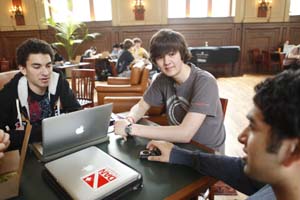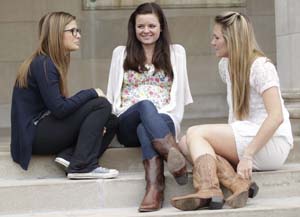
This winter and spring, high school seniors from around the globe arrived home to find thicker than normal letters from Washington University in St. Louis in their mailboxes.
For most of them, reading the words I am pleased to welcome you to the Washington University community is exhilarating, the culmination of a dream come true. Thoughts turn to dorm rooms, social activities, and matriculating on the Danforth Campus in just a few short months.
But for a select number, the exciting offer of admission comes with an unexpected twist: admission through the January Program, which means their full-time studies won’t begin until January 2012.
Exhilarating? Yes. Surprising? Absolutely — even shocking for some, particularly those expecting to start full-time studies in late August.
But what these students are about to learn is that life isn’t linear, that the best laid plans sometimes go asunder, and that if you take advantage of unexpected events, things often turn out OK — and sometimes even better than expected.
These are the applicants — between 40-50 each year in the College of Arts & Sciences and the Sam Fox School of Design & Visual Arts — who make up the January Program, a unique experience that allows talented young men and women opportunities to transition to WUSTL and arrive on campus five months after their peers without skipping a beat.
At the core of the program: making the most of the fall semester away from the WUSTL campus, through internships, community service, study abroad, national outdoor leadership training, and/or courses at colleges and universities near their homes.
“While the campus infrastructure (especially housing) limits the number of freshmen we can enroll each fall, the January Program allows a few more talented students the opportunity to join our community,” says Julie Shimabukuro, director of admissions. “The experiences that they have during the fall semester have been interesting and varied, and we have been delighted to see how quickly they have settled in once they arrive on campus.”
And even though they are arriving later in the academic year, they are Washington University students immediately.
That means these young adults have at their disposal tremendous resources that allow them to connect to the campus community long before their January matriculation, such as a peer adviser, a current January Program student who reaches out soon after students receive their letters; academic deans from their schools who offer advice on making use of their time; and participation in the Spring Preview with all the incoming students. Once they arrive in January, they also have the benefit of Washington University Student Associates (WUSA’s) and a Peer Health Educator, just as other freshmen do.
January Program participants also are given the opportunity to earn academic credit through the university. The Freshman Summer Academic Program (FSAP), open to all incoming freshmen, is an intensive five-week program in which incoming students can earn six college credits and experience life on campus; and the Fall Program is four long weekends — exclusively for January Program students — throughout the fall semester in which they take a course for three credits, take part in orientation, receive advising and register for spring courses.
Matthew DeVoll, PhD, assistant dean in the College of Arts & Sciences, and Georgia Binnington, associate dean in the Sam Fox School of Design & Visual Arts, are charged with helping the “JProgs,” as they are affectionately known, transition academically.
DeVoll says that once the students get over their initial surprise — their “expectation deferred” — they experience a wide range of emotion.
“There will be the students who are disappointed, who will say, ‘What will I tell people?’ and there will be the students who say, ‘I was going to do a gap year anyway, this is perfect!’” he says.
“Some students are raring to get away from home and to see the world, other students are grateful to stay at home for another semester for personal reasons.”
Ogi Kwon, a native of Iowa City, Iowa, is a freshman in Arts & Sciences who already is considering serving as a JProg WUSA.
“At first, it was a bit disheartening because I really didn’t understand the program,” he says. “Neither did my parents. But we called campus many times and there were so many willing to help. Someone said to me at one point, ‘This means we really want you to be here, in any way, shape or form.’
“That one phrase stuck out, and really made all the difference.”
Making the most of the fall
What’s unique about the WUSTL January Program, compared with other gap programs at other institutions, is that the university does not define what the students must do in the fall, says Harriet Baron, administrative coordinator in the College of Arts & Sciences, who serves as a kind of “den mother” to the students and helps them get acclimated in all areas of the university.
“We let the students decide for themselves how they’re going to spend their time,” she says.
And those decisions are as creative and diverse as the WUSTL student body.

Jill McKay, a junior in graphic design in the Sam Fox School, matriculated through the January Program. The Kansas City, Mo., native spent her gap time interning at a small graphic design firm.
Kwon spent the fall of 2010 at College Internationale in Cannes, France, where he took intensive French grammar classes three hours a day and a French sociology class.
Other students have done such myriad things as:
- an internship on a gubanatorial campaign;
- service trips to places such as Poland, Costa Rica, Tanzania;
- service at a nature reserve in Indonesia;
- interning and writing at a magazine in Florida;
- shadowing an orthopedic spine surgeon;
- working on 3-D renderings for an architectural firm;
- laboring on an organic farm in Spain;
- hiking through Patagonia; and
- sailing for a semester throughout the Caribbean and Atlantic halfway around the South Pacific.
And these are the experiences of JProgs from this past year alone.
In each instance, students worked with DeVoll, Binnington, Baron and other advisers throughout the university to design their own program and earn credit. When they add that to possible AP and other credits carried over from high school and participation in FSAP or the Fall Program, most arrive in January with credits equal to their classmates who arrived in August.
“I had a professional life before I got to campus,” McKay says. “It was hard, and I struggled with it, but looking back, I’m glad I did it.
“It helped academically, too,” McKay says. “I took a graphic design class that used the same computer program I used during my internship. My classmates had never seen it; I knew it inside and out.”
Kwon admitted to having initial misgivings, but not anymore. “I said to myself, ‘You know, you can make this semester something special that can be a very good part of your four-year experience at Washington University.’
“Plus, going to France was better than living at home.”
Making the transition
JProgs are housed in The Village, which has extra room due to the fact many upperclassmen spend the second semester abroad or in internships. The January Program students join other transfer and exchange students in the Spring Convocation and Orientation, and then jump right in with classes and activities.
That’s where, McKay says, the Fall Program helped her.
“I don’t think I could have done it without the Fall Program,” McKay says. “As a freshman, your first social group is your freshman floor. In this program, the JProgs are your freshman floor. I met my best friends that fall. We met up again in The Village where we housed, and we still live together.”
DeVoll says not every student is cut out to be a JProg.
“Admissions is looking for those students who have the maturity, flexibility and creativity to make use of this time when they weren’t expecting to,” he says. “And it is a big demand on students who thought that maybe things would be taken care of, now they need to figure it out. That’s where the need to be mature and flexible comes in.
“They learn quickly there’s more than one way to go through college,” DeVoll says.
By April and May, the JProgs are settled in, have housing and classes for next year, and, in many ways, display a maturity beyond the average college freshman.
“You have to be proactive,” Kwon says. “But no one can make you have a good attitude. It’s all about what you make of it.”